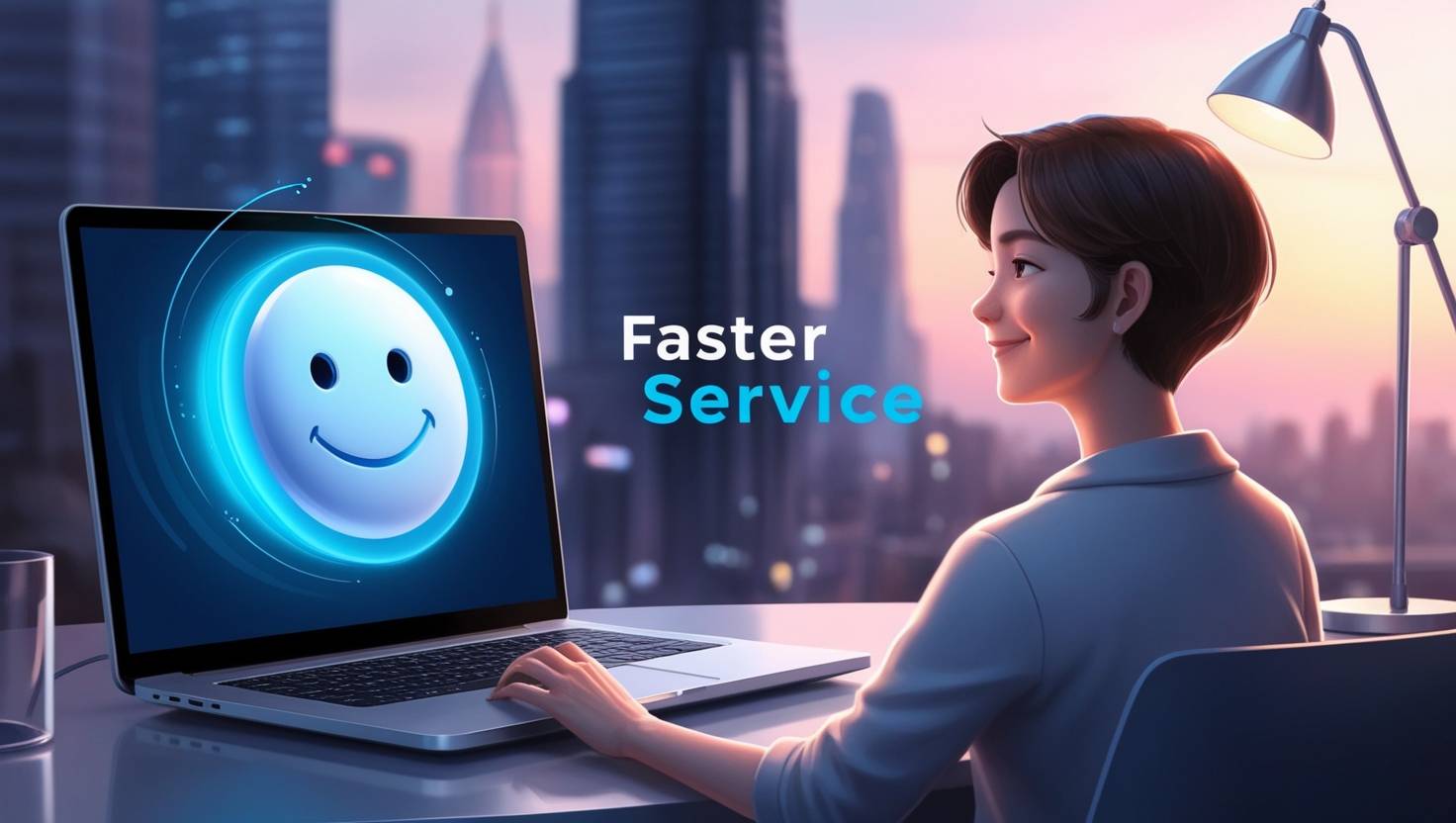When was the last time you waited on hold, lost valuable time waiting for an answer, or felt like you just knew there had to be a faster way to get what you needed?
If you’re like most of us, the answer is probably too recently. That’s why one-third of consumers today are saying “Enough!” and are turning to AI agents for quicker, more efficient service. And here’s the kicker: they’re loving it! That’s right—people are embracing AI not only to save time but to simplify their lives.
So, what’s happening here? Why are people increasingly leaning on AI, and what does this mean for YOU?
Let’s dive in because this could change the game for you and your business.
The Rise of AI Agents: Why Consumers Are Hooked
You might be wondering why consumers are choosing AI agents over human reps. Here’s the deal—AI agents are fast, smart, and ready 24/7. Imagine an agent who never takes a day off, never gets tired, and never needs a break. An agent that can process requests, answer questions, and solve problems faster than anyone in your team could.
And that’s exactly what consumers are discovering. A recent survey showed that over one-third of consumers prefer working with AI for one simple reason: it’s faster! They know they’re not sacrificing quality, and they’re getting answers in record time.
Think of AI agents like the digital Swiss Army knife—able to handle just about any query that comes their way. From simple product questions to complex support issues, these agents are driving up customer satisfaction rates and slashing response times.
Why This Matters (And Why You Should Care)
So, here’s the golden question: what does this trend mean for you? Whether you’re an entrepreneur, a small business owner, or just someone who loves AI tools, this is an opportunity to jump on.
When a market shifts like this, it’s a signal. People are telling you exactly what they want: speed, convenience, and seamless service. And with AI agents, you can give it to them on a silver platter.
Now, think about the possibilities. Imagine having an AI agent as part of your team—one that handles the mundane, repetitive tasks so you can focus on what really matters. Imagine improving customer response times, boosting engagement, and creating a loyal fanbase that keeps coming back because they know you’re the business that gets it.
How to Use AI Agents to Transform Your Business
Ready to see how this works in the real world? Here are three steps you can take to start using AI agents and make waves in your business:
- Identify Repetitive Tasks
Start by listing out tasks you and your team handle over and over again—anything from responding to frequently asked questions to handling basic customer inquiries. This is where AI agents shine. They’re perfect for automating the mundane stuff, so you and your team can focus on higher-value work. - Choose the Right AI Tool
Not all AI agents are created equal. There are tools designed specifically for customer service, sales, and even more personalized recommendations. Find a tool that aligns with your business needs—some popular ones include ChatGPT for customer support, Intercom, or HubSpot’s AI solutions. Test a few out, see which ones fit your style, and get ready to be amazed at how much time they save you. - Let the AI Run and Watch the Magic Happen
Once you’ve chosen your AI tool, it’s time to integrate it into your workflows. Set up the rules, provide training data (so it can understand your customers’ needs), and let it do its thing. The AI will adapt and learn from each interaction, refining its responses over time.
Here are some popular examples of AI agents that are transforming customer service, sales, and support across various industries:
1. ChatGPT by OpenAI
- Purpose: Customer service, support, content creation.
- Description: ChatGPT is a versatile AI chatbot that can be used to interact with customers, answer questions, and provide information. It can be customized for specific industries, helping businesses automate their support processes with conversational AI.
- Key Feature: Natural language processing for smooth, human-like interactions.
2. Intercom AI
- Purpose: Customer support, onboarding, user engagement.
- Description: Intercom’s AI agent, known as “Resolution Bot,” assists with automated responses for customer inquiries. It can handle common support requests, onboard users, and provide product guidance, reducing the need for human involvement in repetitive queries.
- Key Feature: Integrates directly with customer communication channels for a seamless support experience.
3. Zendesk Answer Bot
- Purpose: Customer support, help desk automation.
- Description: Zendesk’s Answer Bot uses AI to respond to customer queries based on information from the company’s knowledge base. It directs customers to relevant articles, FAQs, or tutorials, helping them find answers quickly.
- Key Feature: Seamlessly integrates with existing Zendesk help desk systems.
4. HubSpot Chatbot Builder
- Purpose: Lead generation, customer support, sales assistance.
- Description: HubSpot’s AI-powered chatbot is designed for marketing, sales, and customer service. It can answer questions, book meetings, and qualify leads. It’s particularly helpful for businesses looking to automate aspects of their sales funnel.
- Key Feature: Customizable workflows to engage and nurture leads.
5. IBM Watson Assistant
- Purpose: Advanced support, multilingual support, industry-specific solutions.
- Description: Watson Assistant is an AI-powered chatbot that uses natural language understanding to interact with users. It’s designed for businesses needing more complex, customizable AI solutions. Watson can understand context, maintain conversational flow, and integrate with various applications.
- Key Feature: Highly scalable, with industry-specific templates for sectors like banking, healthcare, and retail.
6. Google Dialogflow
- Purpose: Virtual agents, customer support, voice and chat integration.
- Description: Dialogflow, part of Google Cloud, enables businesses to create conversational interfaces with AI-powered chatbots and voicebots. It’s popular for building virtual agents that can be used across websites, mobile apps, and messaging platforms.
- Key Feature: Integration with Google Assistant, allowing for a seamless voice-enabled customer experience.
7. Drift Chatbot
- Purpose: Sales and marketing, lead qualification, personalized customer engagement.
- Description: Drift’s AI chatbot is designed to qualify leads, answer visitor questions, and book sales meetings automatically. Drift is particularly popular among sales and marketing teams for its focus on engaging website visitors and moving them through the sales funnel.
- Key Feature: Integrates with CRM systems and can personalize responses based on user behavior.
8. Replika
- Purpose: Personal assistant, mental wellness, conversational engagement.
- Description: Replika is an AI chatbot primarily aimed at personal users, but it demonstrates the potential of AI agents in conversational engagement and emotional support. Businesses are beginning to explore similar models to provide personalized customer experiences.
- Key Feature: Adaptive, learning to personalize interactions over time based on previous conversations.
9. Salesforce Einstein Bots
- Purpose: Customer support, sales assistance, service automation.
- Description: Einstein Bots by Salesforce are AI-driven chatbots that support customer service reps by handling common queries. They’re designed to integrate with Salesforce’s CRM, making them particularly valuable for companies already using the Salesforce ecosystem.
- Key Feature: Automates interactions while pulling in relevant customer data from Salesforce for context.
10. Ada
- Purpose: Customer service, personalized support, automation for high-volume queries.
- Description: Ada is a customizable AI chatbot that helps companies manage high volumes of customer inquiries. It uses machine learning to handle repetitive tasks and learns over time, becoming more efficient at providing personalized support.
- Key Feature: Tailored solutions for high-volume, multi-channel customer interactions.
These AI agents can streamline support, enhance customer satisfaction, and free up teams to focus on higher-value tasks. By automating repetitive interactions, businesses can deliver faster, smarter service, which translates to happier customers and a more efficient operation!
Real Talk: The Results You Can Expect
When you’re leveraging AI agents, you’re not just adding a tool—you’re adding a game-changer. Imagine reducing response times from hours to seconds, or delighting customers with fast, personalized answers. That’s the power of AI in today’s market.
People want fast results, and if you can give it to them, you’re not only making your customers happy, but you’re positioning yourself as a leader in a fast-growing trend.
So, here’s my advice: jump in and make the most of this AI wave! The demand for speed and efficiency is only going up, and with the right tools, you can be at the forefront, reaping the rewards while your competition is still figuring it out.
Ready to Get Started?
Don’t let this trend pass you by! Take the first step toward integrating AI into your business and start impressing your customers with lightning-fast service. The tools are there, the opportunity is massive, and all that’s left is for you to make the move.
Embrace the future, be the leader in your space, and watch as AI transforms your business and takes you to the next level.
FAQ: Leveraging AI Agents for Faster, Smarter Service
Q: What exactly are AI agents, and how do they work?
A: AI agents are software applications that use artificial intelligence to perform tasks and interact with users. They’re powered by machine learning algorithms and natural language processing, which means they can understand and respond to customer questions, solve problems, and handle repetitive tasks automatically. Think of them as highly efficient virtual assistants available 24/7!
Q: Why are AI agents faster than human representatives?
A: AI agents are programmed to access vast information databases instantly, allowing them to answer questions and process requests without hesitation. Unlike humans, they don’t need breaks or time to think—they deliver solutions almost instantly based on their programming and training. This means faster response times and a better experience for customers.
Q: What kinds of tasks can AI agents handle?
A: AI agents are versatile and can manage a wide range of tasks, from answering common questions and guiding customers through processes to helping with account management and troubleshooting. They’re ideal for repetitive tasks but can also handle more complex queries as they learn from interactions over time.
Q: Do AI agents replace human jobs?
A: AI agents are designed to enhance human work, not replace it. They handle repetitive tasks and free up human teams to focus on more creative, complex, and valuable work, like problem-solving, strategy, and personalized customer care. Think of AI as an efficiency booster, giving your team more time to focus on tasks that require a personal touch.
Q: How can I integrate AI agents into my business?
A: Start by identifying repetitive tasks or areas where customers need frequent support. From there, choose an AI tool that fits your business needs. Many platforms, like ChatGPT, Intercom, and HubSpot, offer AI-based customer service and support solutions. Most of these tools are designed for seamless integration with your existing systems.
Q: How much does it cost to set up an AI agent for my business?
A: The cost varies based on the tool you choose and the level of customization you need. Many AI tools offer tiered pricing plans, starting with basic versions and scaling up to more advanced options with added features. Some platforms even offer free trials so you can test their effectiveness before committing.
Q: What are the potential challenges of using AI agents?
A: While AI agents are highly efficient, they can sometimes struggle with highly complex or unique requests. Ensuring they have a clear set of guidelines and training data helps them perform well, but you may still need human oversight for specialized customer needs. Additionally, it’s essential to monitor AI interactions regularly to ensure accuracy and customer satisfaction.
Q: Are customers comfortable interacting with AI agents?
A: Yes! Many customers actually prefer AI agents because they provide quick, straightforward answers without wait times. As long as the AI is programmed to deliver accurate information and respond naturally, most users find the experience convenient and satisfying. Plus, as AI becomes more common, comfort levels continue to rise.
Q: How can AI agents improve customer satisfaction?
A: AI agents respond faster, reduce wait times, and offer 24/7 service, which means customers get the support they need whenever they need it. This efficiency often leads to higher customer satisfaction and loyalty. Additionally, by handling routine inquiries, AI agents give human teams more time to deliver personalized care to customers with more complex needs.
Q: What are some popular AI tools I can start with?
A: Great options for AI agents include tools like ChatGPT, Intercom, HubSpot AI, and Drift. Each tool has unique strengths, so it’s worth exploring which one aligns best with your business goals. Many offer robust customer service solutions with easy setup and integrations.
Q: How do I know if AI agents are right for my business?
A: If you’re looking to streamline processes, reduce response times, and improve efficiency, AI agents can be an excellent fit. Start by assessing your customer service needs and any tasks that could be automated. If speed and efficiency are priorities, then AI agents could be a game-changer for your business!





